| Here’s a fun fact for you: Did you know that there are over 1.3 million schools in India with about 34.7 million students in high school alone? Source: Times of India & IBEF |
India has almost three times the number of schools than China, despite a similar population! Out of these, you wouldn’t be surprised to know that most of the schools follow the Central Board of Secondary Education (CBSE) curriculum – the largest board in India. A close second is the Indian Council of Secondary Education (ICSE) by Council for the Indian School Certificate Examination.
When the conversation is about curriculum, one of the most commonly asked questions by parents is the difference between the two highly popular boards: CBSE and ICSE. When you look at an overview of the two, the curricula have many similarities.
The top similarity is that the two curriculum systems are rooted in the Indian value system and educational history, making them relatable and easy to understand. Thus, the struggle to choose between the two is real.
Have you thought about it: Will CBSE help my child’s dreams come true or ICSE? Where should I admit my child? Will it help them in future to prepare for competitive exams like JEE or NEET? Which one of the two is good for study abroad plans?
The questions are many, but the answers aren’t very difficult to find. Let’s get started to find them!
In this blog, we will take you through the differences and similarities, while helping you make your decision one step at a time.
History & Overview
While CBSE is a hot favourite among Indian parents, it might come as a surprise to you that it was ICSE that was established first in 1958. CBSE came into being only in 1962. Both of them strive to provide high-quality education through a rather rigorous approach to learning.
CBSE is not just a popular choice in India. About 25 countries are affiliated with the board of education including Malaysia, Japan, UAE, Singapore and Russia.
While the two curricula were focused on textual learning, over the years, they have made progressive steps beyond regular teaching methods. CBSE introduced the Continuous Comprehensive Evaluation (CCE) for grades 6 to 10. This is aimed to test students throughout the year rather than a single exam at the end of the year.
Curriculum TriviaICSE initially began as an alternative to the American and British systems but evolved into a comprehensive curriculum laying more emphasis on practice than theoretical knowledge. |
The curriculum is also followed globally in countries such as UAE, Singapore and Indonesia, among others. It has been evolving over the years with one of the latest changes being the introduction of additional subjects and compartmental exams for the students.
Acceptance of Indian Curriculum in Global Universities
Indian students are increasingly opting for overseas education right from their undergraduate courses. About five years ago, most of these students belonged to international curriculum schools. However, there has been a new trend with national board students also deciding to study abroad.
Over the past three to four years, there has been a steady flow of students from CBSE and ICSE schools to universities abroad. While the USA continues to be a favourite destination, Hong Kong, Canada, the UK and Australia are among the top options too.
In a recent development, the British universities have agreed to recognise plus-two (grade 12) certificates awarded by India’s CBSE.
Talking about the same, HRD Minister, Smriti Irani, said:
Till now, CBSE students faced a problem as their certificate was not being recognised by several institutes. I am happy to state that all UK universities will recognise the certificates now. We have also decided to set up a working group as to how the two countries can go ahead together, especially in areas of school assessment program and college leadership program.
The University of Oxford, Harvard the University of Toronto and more recognise both CBSE and ICSE boards and grades.
For a better understanding of what students are opting for, let’s have a look at Univariety’s wide network: 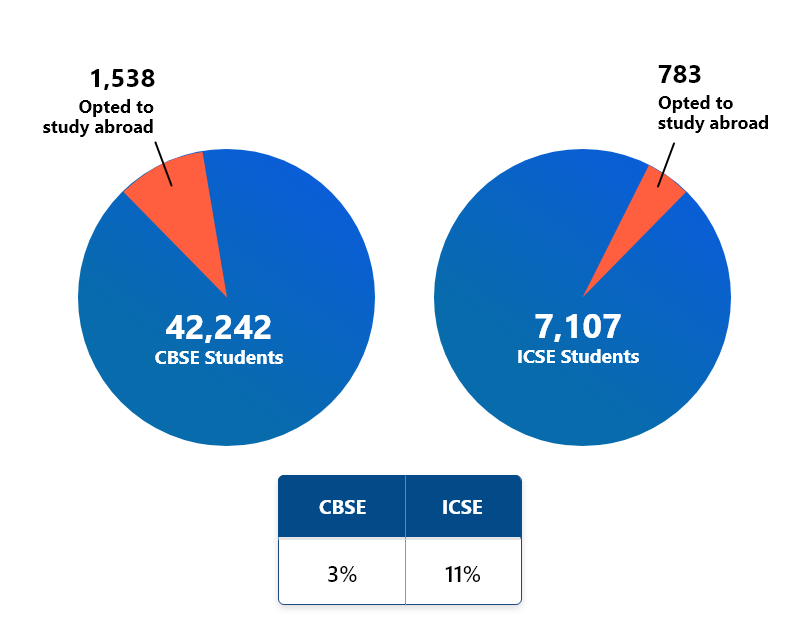
While we have discussed the overview and philosophy, it’s important to understand the factors that differentiate the two boards. Apart from external elements, which are mostly the components of the curriculum, there’s a list of internal factors that have a huge impact on YOUR decision.
Let’s first dive deep into the components of the two boards that make them different.
1. Syllabus
First, let’s discuss the syllabus! The syllabus offered by CBSE is easier than ICSE, especially in terms of subject depth. The former has been more traditional in its approach, laying emphasis on the assimilation of knowledge, especially in the fields of Mathematics and Sciences.
Additionally, the curriculum focuses on preparing students for entrance and competitive examinations, resulting in a shift from the importance of languages. The importance laid on extra-curricular activities is also much less because students are encouraged to concentrate on their studies and examinations.
The ICSE curriculum is more comprehensive with a balance between all the fields – Humanities, Sciences and Languages. With a focus on personality development, the approach to learning is broader.
Students interested in Humanities find the curriculum to be more engaging and flexible as it offers varied subjects. Your child can choose subjects of her interest along with others. The board offers more subject options for students to choose from than CBSE.
The medium of instruction for CBSE is English and Hindi, while ICSE recommends English only.
Read: Subject selection for ICSE
COVID-19 UpdateDue to the pandemic, CBSE and ICSE have reduced the syllabus for grades 9 to 12 for the academic session 2020-2021. While the former has reduced it up to 30%, ICSE’s syllabus reduction is by 25%. The boards stated that the objective is to reduce the examination stress of the students. |
2. Pedagogy
With the world rapidly changing, it’s important for students to be ready for new challenges. Thus, the teaching approach by CBSE and ICSE has also undergone significant change in the last decade. The focus has majorly increased on learning through experience and experimentation rather than one-way teaching.
The curriculum followed by CBSE is from National Council of Educational Research and Training (NCERT) books, which are more illustrated and easy to comprehend. The teaching is largely methodical.
On the other hand, ICSE offers intensive content-focused teaching and textbooks. The pedagogy is diverse and embedded in content and knowledge. However, while the board prescribes a list of textbooks, there’s no council that offers books and schools are allowed to make the choice. This poses a challenge for teachers.
Also Read: Expert Guide to International Baccalaureate (IB) Curriculum [Everything You Need To Know]
3. Streams for Senior Secondary Education
Thirdly, streams offered by the two curricula are another major factor that needs to be considered. CBSE offers pre-set combinations of subjects as streams under Science, Commerce and Humanities. The combinations are rather narrow and pertain only to a particular field. The choice offered is in the 5th subject.
While ICSE’s curriculum is similar to CBSE for senior secondary education, it provides a better volume and depth to the subjects. The teaching and syllabus are comprehensive and extensive, covering large parts of each field. Additionally, English is considered equally important and is compulsory for all students.
4. Assessments
An important point of difference between the two boards is the assessment and grading of students. Firstly, let’s note that the two curriculum options consider grade 11 and 12 paramount for academics. Therefore, the rigour is higher with little or no extra-curricular activities.
In ICSE, internal assessments are vital and practical tests are aggregated with the overall scores. The board lays emphasis on lab work too! At the same time, English, which is a compulsory subject, gets a lot of attention from the exam point of view. The evaluation focuses on cognitive learning outcomes. ICSE emphasises understanding, skill development, and knowledge as well as its application of subjects and learning.
It’s a known fact that CBSE is a lot about rote learning and memorisation with less focus on higher mental abilities like critical thinking and creativity. Rote learning takes precedence over understanding and knowledge. That’s the reason why CBSE is suggested for students interested in competitive exams.
The grading system for CBSE is alphabetical-based, while for ICSE, the marks are shown in numbers, giving a clear idea to students as to how much they have scored.
5. Level of Complexity
As discussed earlier, in complexity, ICSE certainly takes the cake! With detailed concepts and broad subject knowledge, the board is considered to be of a much higher level of difficulty than CBSE.
It’s a common notion that ICSE students are smarter because they have completed a more difficult syllabus. However, each of them has its own pros and cons, and just studying on a particular board doesn’t define the intelligence level of any student.
Now that we’ve discussed the major components of each of the curriculum options, let’s understand your expectations and dreams for your child. This makes a big difference in your decision-making. At the end of the day, you want a curriculum that guides your child towards their dreams.
6. Higher Education
|
Did you know that only 11% of parents were confident that they and their children were well-prepared in terms of their college dreams? Source: Univariety Parents Aspirations Concerns & Expectations |
That’s right! Parents are usually worried about their children’s higher education dreams and plans. Most often, their dreams don’t align with the curriculum and that poses a problem.
When talking about higher education, there are three major factors to consider:
- Entrance Test Preparation
As mentioned earlier, the CBSE curriculum offers top-notch preparation for STEM courses and competitive exams like IIT and NEET.
|
Out of about 10,000 students who qualified for the IIT, |
ICSE’s focus on language and the overall development of students may not be the best for competitive exams in the country. However, it adds value if your child is aiming to study abroad.
- College admissions
Indian public institutes are usually dependent on entrance exams. These tests are rigorous and CBSE provides the perfect preparedness for it. In terms of college admissions into global universities, ICSE gives your child better training with its extracurricular activities and in-depth subject knowledge.
- Study abroad
If your child is planning to study abroad, she will need the exposure and personality development that will make her stand out. ICSE gives your child the exposure she needs for higher studies abroad over CBSE.
However, choosing one curriculum doesn’t stop your child from making any of their dreams come true.
Also Read: Your Guide To Cambridge Curriculum: Is It The Right Board For Your Child?
7. Career Plans
We discussed earlier how the ICSE curriculum offers a great opportunity for students aiming to opt for Arts and Humanities, while CBSE provides the training that Science streams require.
Let’s look at Univariety’s network of students:
- Out of 7,107 students from ICSE schools, 1,758 opted for STEM.
Let’s now look at Arts & Humanities:
8. Extra-curricular Activities
As a part of the subjects and syllabus section, we discussed how ICSE provides more room for creativity and extra-curricular activities. In fact, Socially Useful Productive Work (SUPW) is a mandatory subject in ICSE.
To cope up with the constantly changing world, CBSE also has increased its importance on non-academic activities. However, it’s not as much as what ICSE offers.
If you’re keen on academic focus for your child, CBSE is a better choice. But if extra-curricular activities are on your mind for overall development, then you must rethink!
Also Read: How to Choose the Right Curriculum for Your Child? [8 Factors to Consider]
How to Choose the Right Curriculum for Your Child?
After understanding the two popular and most commonly chosen boards, it’s time for you to make the decision. Just understanding the curriculum doesn’t get you the answer to your question – How do I choose the right curriculum for my child?
There are several questions and factors that play a huge role in deciding the right curriculum for your child. More often than not, parents rely on advice from friends and family, whose suggestions are based on their expectations.
We highly suggest you skip that approach and instead make a decision by yourself.
Developed by Univariety with inputs from top CBSE educators, International Baccalaureate Organisation, Cambridge International, and University Faculty, Curriculum Selector is the world’s first curriculum evaluation program for parents that offers a scientifically researched roadmap to choosing the right curriculum for your child.
You will go through the following key steps that will help you make the big decision:
-
Deep Fitment Analysis
A questionnaire designed around scenarios based on different factors that help you collect your thoughts and reconsider decisions, and receive a Deep Fitment Analysis at the end.
-
Expert Modules
These informative modules will give you insights into the difference between each curriculum and to critical skills that your child needs for the future. Here’s a sample video for you:
-
Best-Fit Curriculum Recommendations & Detailed Report
The Recommendations are based on highly reliable research data and are scientifically designed by integrating qualitative inputs with analytical methods.
-
Personalised Counselling Session
A one-on-one review of your expectations and the report with a counsellor will help you get an interpretation of your analysis from a guidance expert.
Know More About Curriculum Selector
Summing It Up
As discussed in the detailed blog, the two curricula have their own pros and cons, making it a good option for students, depending on their dreams.
The CBSE syllabus is comparatively more rational and traditional in its approach. Being the largest educational system in the country, the board is a better choice in terms of transferability.
The curriculum is designed for a specific year and is divided into segments with a definite number of periods for teaching, material and exams. This enables the teachers to prepare in a coherent manner. It is a more suitable choice if your child aims to select one of the STEM courses or competitive exams. However, it doesn’t eliminate the choice of studying abroad or choosing Arts and Humanities.
ICSE, on the other hand, is more balanced with a focus on Language, Arts and Science. With internal assessments and emphasis on communication skills, the curriculum offers an overall development of your child. It’s highly recommended for students to aim at pursuing careers in the fields of Humanities and Management.
To match international curriculum options in India, the two boards have undergone a significant change over the last 10 years. The focus has shifted from passive learning to learning through experience and experimentation.
Have any questions about the two boards or any other curriculum? Ask us in the comments below!
When Harini Prasad is not busy researching about top trends in education and learning techniques for students, you will find her writing about all things fashion, travel, cinema, and music. A millennial poster-child, Harini is a former lifestyle journalist with specialisation in child rights, gender, and new media journalism. Currently, she is busy exploring the world of marketing and content creation.



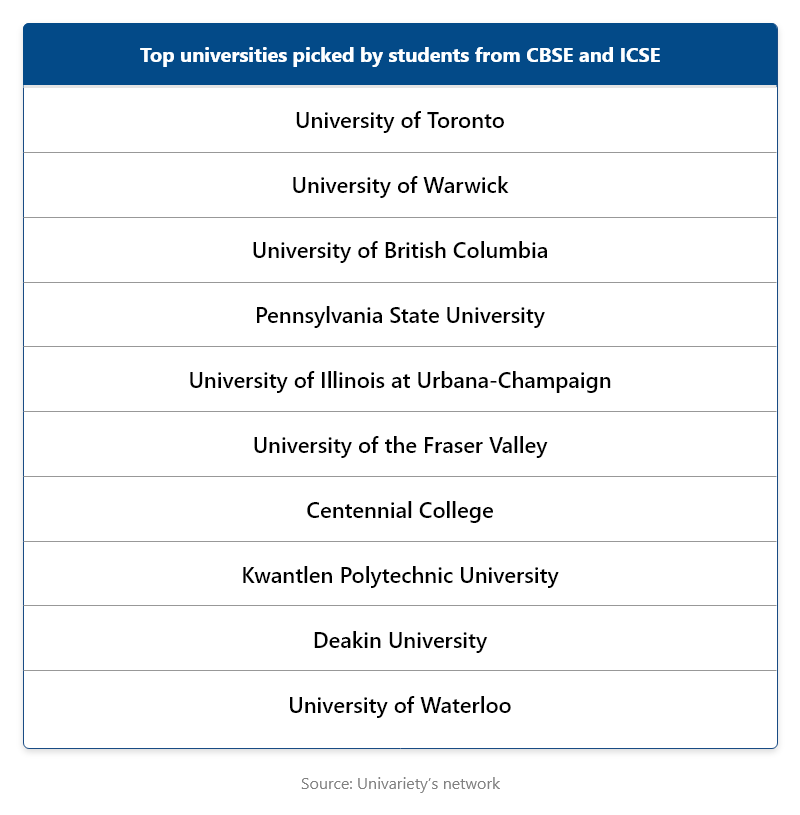
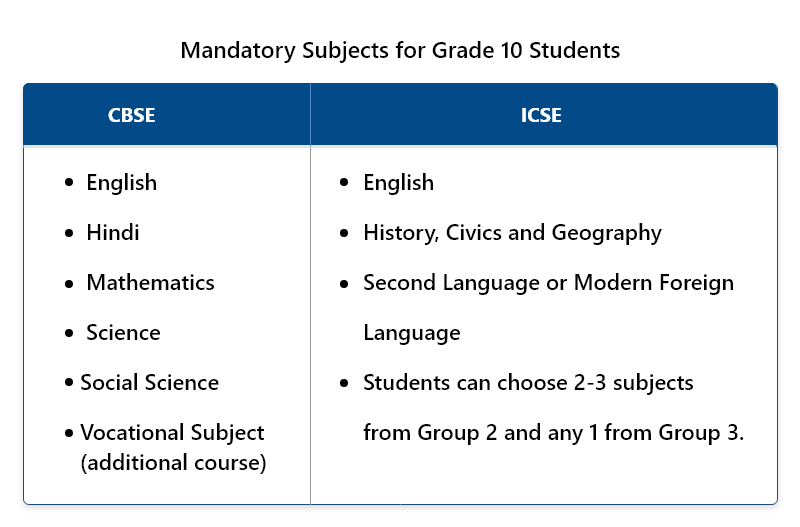
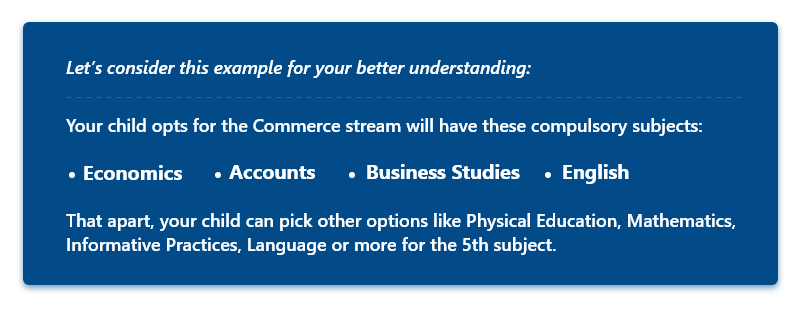
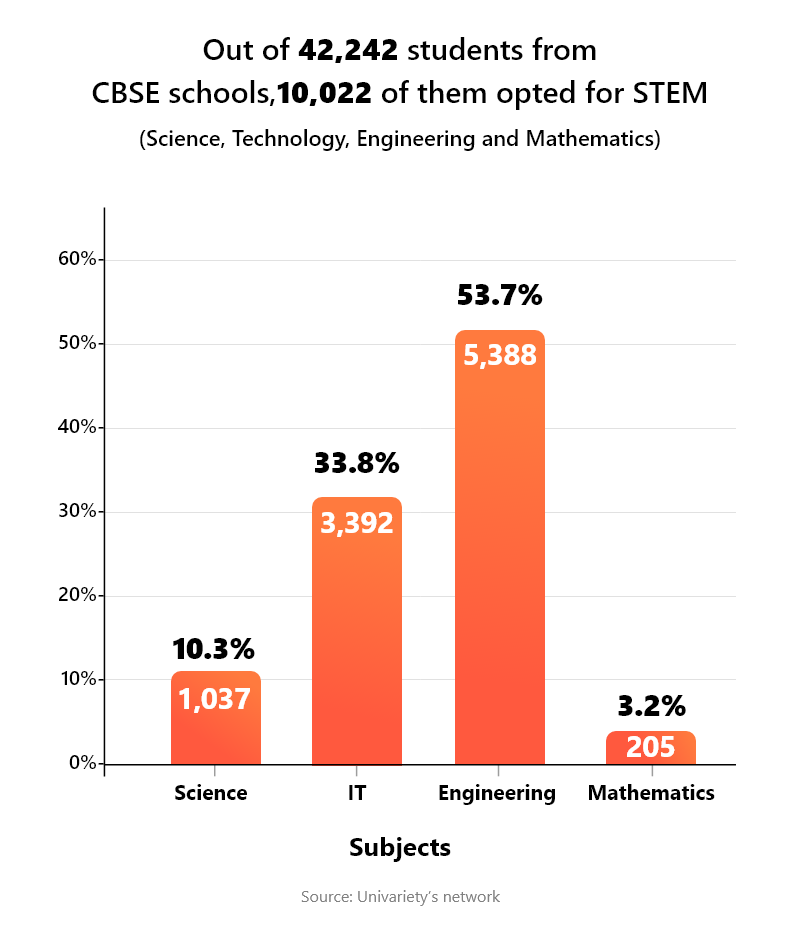
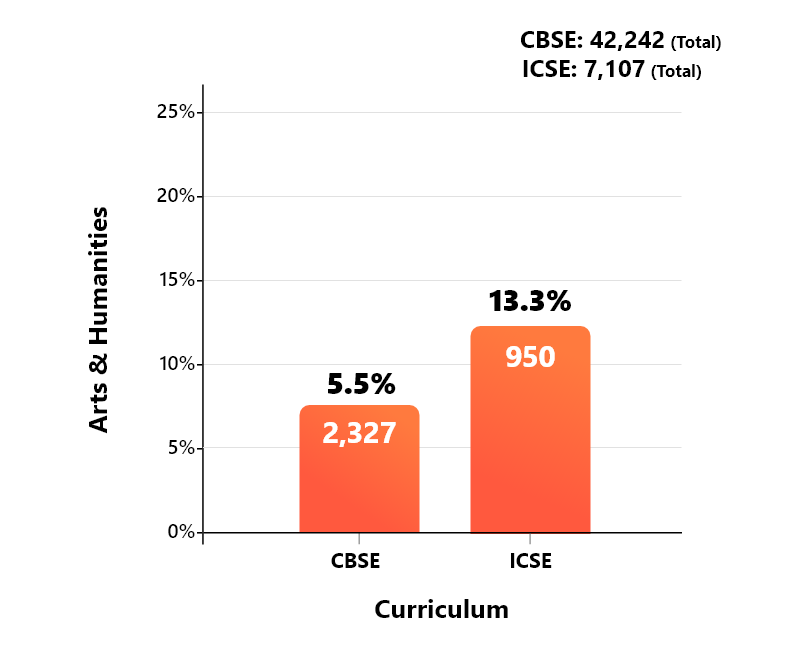
4 Comments
Thank you for the post on different types of courses. Parents look for this information frequently. Nice post..
Very important information for students
Recently, we sent our kid to boarding school. We were very concerned. our way of living. and how well he will adapt to life at the boarding school. whether sending him to boarding school was the right move. We were extremely worried. but I feel relieved after reading this blog. Thank you for the enlightening blog.
Please provide further guidance for selecting schools between CBSE & ICSE in Ahmedabad, Gujarat, India.